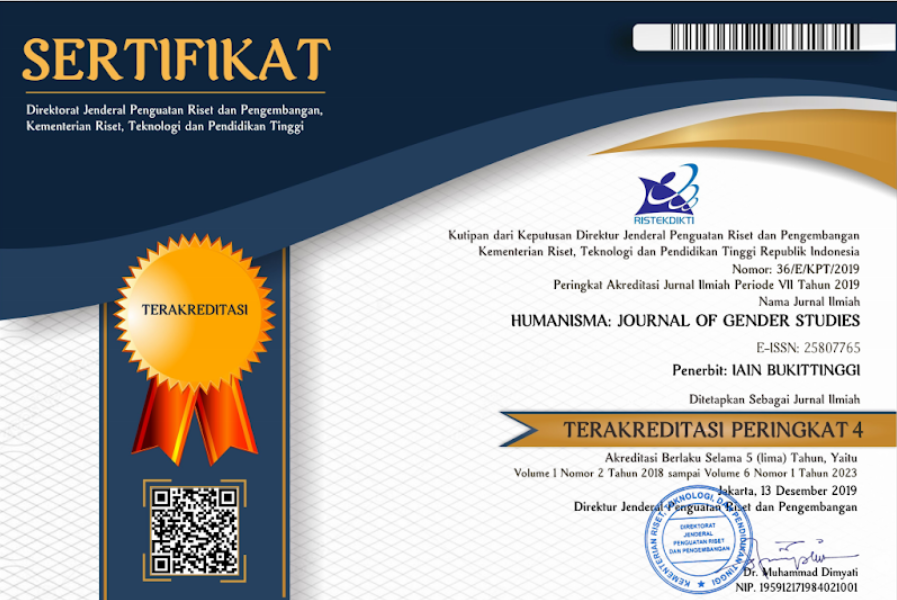Peran Perempuan dalam Mewujudkan Keluarga Sejahtera Menurut Perspektif Ekonomi Islam (Studi Kasus Perempuan Pedagang Kaki Lima di Simpang Tugu Tigo Baleh, Kelurahan Pakan Labuah, Kota Bukittinggi)
DOI:
https://doi.org/10.30983/humanisme.v4i1.3173Keywords:
Women, Families, Prosperity, Economic, IslamicAbstract
Along with the development of the times of course the needs of society increase from year to year. Unlimited human needs, with limited availability of resources. Making women also play a role in meeting the needs of families in an effort to realize a prosperous family. This research was conducted to provide an overview of the role of women in realizing a prosperous family from the perspective of Islamic economics. Research conducted at the Tigo Tigo Baleh Intersection, Pakan Labuah Village, Bukittinggi City uses a qualitative descriptive approach with data obtained from primary and secondary data. The results of this study conclude that in Islamic sharia, to make a living is the duty of the husband. The wife's only obligation is as a housewife who educates children and serves her husband. But it is not forbidden when the wife helps find a living for the family. According to an interviewee at the interview, stated that they women do their activities as traders is to help their husbands in meeting family needs, as well as channeling the hobby of trade that has been buried because only become housewives. This research also provides understanding to women in order to know their rights and obligations in the household, the urgency of how Muslim women who should carry out their daily activities become housewives as well as traders in accordance with the recommendations in their Islamic Syariah.
References
Abdul, Hakim, (2013), Pengaruh Dana Bantuan Langsung Masyarakat Terhadap Penyerapan Tenaga Kerja dan Perkembangan Usaha Tani Padi Serta Kesejahteraan Keluarga Petani Kabupaten Kota di Provinsi Nusa Tenggara Barat Dalam Perspektif Islam, Disertasi tidak diterbitkan, Pascasarjana Universitas Airlangga.
Bakri dan Asafri Jaya, (1997). Konsep Maqashid Syariah menurut al-Syatibi, Jakarta: Logos wacana.
Dean Ridone, “Alasan Orang Minang Suka Berdagangâ€, www.kompasiana.com. Diakses tanggal 6 september 2016.
Evers HD dan Rudiger Korff, 2002, Urbanisasi di Asia tenggara: Makna dan kekuasaan dalam ruang-ruang sosial, Jakarta: Yayasan Obor Indonesia.
Faturochman Dan Agus Dwiyanto, (1998), “Vlidasi dan Reliabilitas Pengukuran Keluarga Sejahtera†Jurnal Populasi, Vol. 9, No. 1.
Haryanto, Sindung. Sosiologi Agama Dari Klasik Hingga Postmodern. Yogyakarta: Ar-Ruzz Media. 2015.
Indah Ahdiah, Peran-Peran Perempuan Dalam Masyarakat, Jurnal Academia Fisip Untad, Vol. 05, No. 02, Oktober 2013.
Loly Anggraini, Wawancara Pribadi, Selasa 17 Maret 2020.
Miles, (1985), Social Indicator for Human Development, From Printer Publicers.
Martini Dwi Pusparini, (2015), “Konsep Kesejahteraan dalam Ekonomi Islamâ€, Islamic Economics Journal, Vol.1 No. 1.
Nelli Jumni, Kewajiban Nafkah Keluarga Dalam Pemberlakuan Harta Bersama, Al Istinbath: Jurnal Hukum Islam Vol. 2, No. 1, 2017.
Purwosutjipto, 1999, Pengertian Pokok Hukum Dagang Indonesia: Pengetahuan Dasar Hukum Dagang, Jakarta: Djambatan.
Pusat Pengkajian dan Pengembangan Ekonomi Islam, 2008, Ekonomi Islam, Jakarta: PT. Raja Grafindo Persada.
Ryandono dan Muhammad Nafik Hadi, (2008), Ekonomi ZISWAQ (Zakat, Infaq, Shadaqah dan Waqaf). Surabaya: IFDI dan Cenforis.
Rozalinda, (2014), Ekonomi Islam: Teori dan Aplikasinya pada Aktivitas Ekonomi, Jakarta: PT. Raja Grafindo Persada.
Sutrisno dan Edy, (2009), Manajemen Sumber Daya Manusia, Jakarta: Kencana Edisi Pertama, Cetakan Pertama.
Sanapiah Faisal, (2015), Format -format Penelitian Sosial, Jakarta: Rajawali Press.
Their Family’s Welfare Marietta Marlina Telaumbanua dan Mutiara Nugraheni, (2018), “The Role of Housewivesâ€, Sosio Informa, Vol. 4, No. 2.
Wiratama Suwarweni, (2014), Metodologi Penelitian Lengkap, Praktis dan Mudah Dipahami, Yogyakarta: Pustaka Baru Perss.
Ziauddin Sardar, (2016), “Kesejahteraan dalam Perspektif Islam pada Karyawan Bank Syariahâ€, Jurnal Ekonomi Syariah Teori dan Terapan, Vol. 3, No. 5.
Zuwardi, Pemikiran Ekonomi Sosialis Tan Malaka Dalam Perspektif Ekonomi Islam, Jurnal Imara, Vol. 1, No. 1, Desember 2017.
Zuwardi, Konsep Produksi Menurut Tan Malaka Ditinjau dari Perspektif Ekonomi Islam, Jurnal Jusie, Vol. IV, No. 2.
Downloads
Published
How to Cite
Issue
Section
Citation Check
License
Authors who publish with this journal agree to the following terms:
- Authors retain copyright and grant the journal right of first publication with the work simultaneously licensed under a Creative Commons Attribution-ShareAlike 4.0. that allows others to share the work with an acknowledgment of the work's authorship and initial publication in this journal.
- Authors are able to enter into separate, additional contractual arrangements for the non-exclusive distribution of the journal's published version of the work (e.g., post it to an institutional repository or publish it in a book), with an acknowledgment of its initial publication in this journal.
- Authors are permitted and encouraged to post their work online (e.g., in institutional repositories or on their website) prior to and during the submission process, as it can lead to productive exchanges, as well as earlier and greater citation of published work (See The Effect of Open Access).



